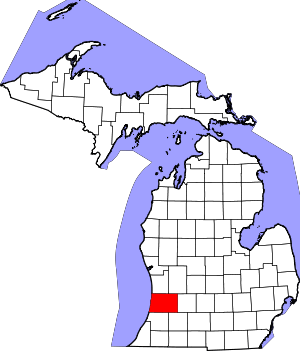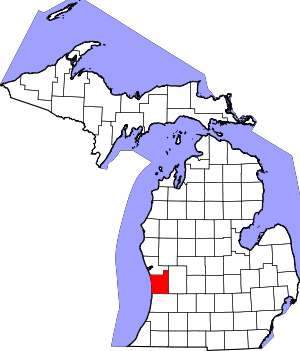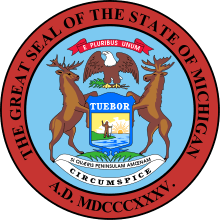Holland, Michigan
Holland is a city in the western region of the Lower Peninsula of the U.S. state of Michigan. It is situated near the eastern shore of Lake Michigan on Lake Macatawa, which is fed by the Macatawa River (formerly known locally as the Black River).
Holland, Michigan | |
|---|---|
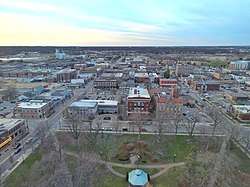 | |
| Nickname(s): The Tulip City | |
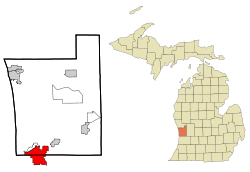 Location of Holland within Ottawa County, Michigan | |
 Holland, Michigan Location in the United States | |
| Coordinates: 42°47′N 86°6′W | |
| Country | United States |
| State | Michigan |
| Counties | Ottawa, Allegan |
| Government | |
| • Mayor | Nathan Bocks |
| Area | |
| • City | 17.45 sq mi (45.20 km2) |
| • Land | 16.68 sq mi (43.21 km2) |
| • Water | 0.77 sq mi (1.99 km2) |
| Elevation | 662 ft (202 m) |
| Population | |
| • City | 33,051 |
| • Estimate (2019)[3] | 33,216 |
| • Density | 1,990.89/sq mi (768.68/km2) |
| • Urban [4] (2015) | 113,164 |
| • Metro | 1,433,288 (Grand Rapids-Holland-Muskegon metropolitan area) |
| Time zone | UTC-5 (EST) |
| • Summer (DST) | UTC-4 (EDT) |
| ZIP codes | 49422-49424 |
| Area code(s) | 616,269 |
| FIPS code | 26-38640[5] |
| GNIS feature ID | 0628421[6] |
| Website | www www |
The city spans the Ottawa/Allegan county line, with 9.08 square miles (23.52 km2) in Ottawa and the remaining 8.13 square miles (21.06 km2) in Allegan. As of the 2010 census, the population was 33,051,[7] with an Urbanized Area population of 113,164,[4] Holland, MI Urbanized Area as of 2015, ACS Demographic and Housing Estimates:
Holland is the largest city in Ottawa County, and as of 2013 part of the Grand Rapids-Wyoming-Muskegon Metropolitan Statistical Area. Holland was founded by Dutch Americans, and is in an area that has a large percentage of citizens of Dutch American heritage. It is home to Hope College and Western Theological Seminary, institutions of the Reformed Church in America.
In February 1996 the Holland City Council approved a sister city relationship between Santiago de Querétaro, Querétaro, Mexico and the City of Holland.[8]
History
Ottawa County was originally populated by Ottawa Indians. In 1846, Reverend George Smith established the Old Wing Mission as an outreach to the native population.
Holland was settled in 1847 by Dutch Calvinist separatists, under the leadership of Dr. Albertus van Raalte.[9] Dire economic conditions in the Netherlands compelled them to emigrate, while their desire for religious freedom led them to unite and settle together as a group.[10]
Van Raalte and his colony settled on land in the midst of the Ottawa (Odawa) people's Old Wing Mission Colony near the Black River where it streamed to Black Lake (now Lake Macatawa) which, in turn, led to Lake Michigan. Joint occupation by the two communities was not a marriage made in heaven. Eventually, the Dutch settlers purchased the land from the natives, who moved north in an effort to preserve their way of life and culture.[11]
In 1848, Michigan suffered from a smallpox epidemic. In consideration of the massive influx settlers into the Ottawa County area, Chief Peter Waukazoo and Reverend George Smith decided to move the community as well as the Holland-area[12] Ottawa Mission from Holland up to Northport (on the Leelanau Peninsula) via on boats and canoes.
In Holland's early history, Van Raalte was a spiritual leader, as well as overseeing political, educational and financial matters. In 1847 Van Raalte established a congregation of the Reformed Church in America, which would later be called the First Reformed Church of Holland. On March 25, 1867,[13][14] Holland was incorporated as a city with Isaac Cappon being the city's first mayor. The city suffered a major fire on October 8–9, 1871, the same time as the Great Chicago Fire in Illinois and the very deadly Peshtigo Fire in Wisconsin.[15] Because of the Great Michigan Fire (which included the Port Huron Fire of 1871), Manistee and Port Huron, Michigan also burned at the same time.
Holland was known as the "City of Churches."[16] There are 170 churches in the greater Holland area, many of which are with the Reformed Church in America and Christian Reformed Church in North America denominations. The city is the home to the church that started the trend of the "What Would Jesus Do?" bracelets in 1989.[17] In 1987, a 23-year-old City Council member Phil Tanis was elected mayor of Holland, becoming its youngest mayor while he was still a Hope College student.
Culture

The city is perhaps best known for its Dutch heritage, which serves not only as a part of the city's cultural identity, but the local economy as well: the Tulip Time Festival in May and various Dutch-themed attractions augment the nearby Lake Michigan shoreline in attracting thousands of tourists annually.
The Holland Museum contains exhibits about the city's history. Another, the Cappon House Museum, was built in 1874 and is a historic museum that once housed the first mayor of Holland, Dutch immigrant Isaac Cappon. The Settlers House Museum, a building that survived the great fire, contains furnishings and relics from the 19th Century.
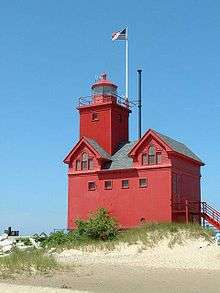
Holland's downtown is listed in the National Register of Historic Places. The "Snowmelt Project" established pipes transporting warm water from the nearby power plant to travel underneath downtown with the purpose of clearing the streets and sidewalks in the downtown area of any snow.
De Zwaan, an original 250-year-old Dutch windmill, is situated on Windmill Island, a municipal park. Its height is 125 feet (38 m) with 40-foot (12 m) sails.
Holland boasts an annual Fiesta, organized by Latin Americans United for Progress, usually on the Saturday closest to May 5 (Cinco de Mayo). Holland is also host to the annual Tulipanes Latino Art & Film Festival, which is held to celebrate the Latino contribution to the culture.
In 2013, Farmer's Insurance named the Holland/Grand Haven Area the most secure mid-sized city in the United States.[18] In 2010, Holland was ranked the second healthiest/happiest town in the United States by the Well-being Index.[19] In 2006, CNN Money named Holland as one of the top five places to retire.[20]
Tourism
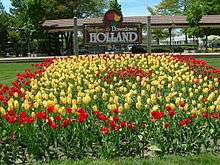
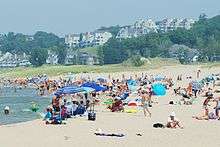
Each May Holland hosts an annual Tulip Time Festival. Tulip planting and the festival began in 1930 when 250,000 tulips were planted for the event.[21] Currently six million tulips are used throughout the city. Tulips are planted along many city streets, in city parks and outside municipal buildings as well as at tourist attractions like Dutch Village, the city-owned Windmill Island Gardens, and at a large tulip farm named Veldheer Tulip Gardens. It is normally held the second week of May, during the tulip blooming season. Cruise ships such as the Yorktown from the Great Lakes Cruising Company make Holland a port of call.[22][23]
About one million tourists visit Tulip Time each year,[24] for which the community finds innovative ways to enhance self-funded projects. It has been ranked as America's third largest town festival and was named Reader's Digest's best small town festival.[25] The Tulip Time Festival has attracted big-name acts in recent years such as: Christina Aguilera in 2000, O-Town in 2001, The Verve Pipe in 2004, and Jars of Clay in 2006. Ed McMahon visited Tulip Time in 2007 along with Bobby Vinton. Comedian Bill Cosby headlined the 2014 Tulip Time Festival.
Holland is located on Lake Macatawa, near the shores of Lake Michigan. Scattered along the shoreline are many public beach accesses including Tunnel Park and the widely popular Holland State Park. Across the channel from the State Park is the Holland Harbor Light, known as "Big Red." Smaller beaches along Lake Michigan are present but not well marked. Public accesses are frequent along dead-end streets bordering the shoreline.
The city's primary shopping district is centered along 8th Street, the city's main street downtown.
The 8th Street business district features a thermal snow - melting system which uses cooling water from the local electric plant. In 1988, the city rebuilt the entire street and sidewalk system, installing the thermal pipes underneath. The system will melt up to an inch an hour down to 15°.[26]
Geography
According to the United States Census Bureau, the city has a total area of 17.35 square miles (44.94 km2), of which 16.59 square miles (42.97 km2) is land and 0.76 square miles (1.97 km2) is water.[27]
Demographics
| Historical population | |||
|---|---|---|---|
| Census | Pop. | %± | |
| 1870 | 2,319 | — | |
| 1880 | 2,620 | 13.0% | |
| 1890 | 3,945 | 50.6% | |
| 1900 | 7,790 | 97.5% | |
| 1910 | 10,490 | 34.7% | |
| 1920 | 12,183 | 16.1% | |
| 1930 | 14,346 | 17.8% | |
| 1940 | 14,616 | 1.9% | |
| 1950 | 15,858 | 8.5% | |
| 1960 | 24,777 | 56.2% | |
| 1970 | 26,337 | 6.3% | |
| 1980 | 26,281 | −0.2% | |
| 1990 | 30,745 | 17.0% | |
| 2000 | 35,048 | 14.0% | |
| 2010 | 33,051 | −5.7% | |
| Est. 2019 | 33,216 | [3] | 0.5% |
| U.S. Decennial Census[28] | |||
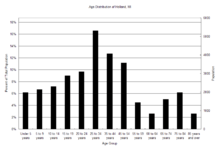
2010 census
As of the census[2] of 2010, there were 33,051 people, 12,021 households, and 7,593 families residing in the city. The population density was 1,992.2 inhabitants per square mile (769.2/km2). There were 13,212 housing units at an average density of 796.4 per square mile (307.5/km2).
Race and Hispanic or Latino Origin: The racial makeup of the city was 85.2% White alone, 4.0% Black or African American, 0.5% Native American, 3.9% Asian, 0.1% Pacific Islander, 5.0% from two or more races. Hispanic or Latino of any race were 22.7% of the population, and White not Hispanic or Latino were 70.0%.[29]
There were 12,021 households of which 32.8% had children under the age of 18 living with them, 46.5% were married couples living together, 11.9% had a female householder with no husband present, 4.7% had a male householder with no wife present, and 36.8% were non-families. 29.8% of all households were made up of individuals and 13.5% had someone living alone who was 65 years of age or older. The average household size was 2.52 and the average family size was 3.13.
The median age in the city was 31.7 years. 24% of residents were under the age of 18; 16.5% were between the ages of 18 and 24; 24.7% were from 25 to 44; 21% were from 45 to 64; and 13.7% were 65 years of age or older. The gender makeup of the city was 47.5% male and 52.5% female.
Government
The City of Holland uses a council/manager form of government. The day-to-day operations of the city are under the supervision of the city manager and his/her staff. The city manager is responsible for selecting all department heads, preparation of the budget and supervision of all employees through his/her appointments.
The city manager serves at the direction of the mayor and city council which are elected positions. The current city manager is Keith Van Beek, former Ottawa County deputy county administrator, who was appointed in February 2018 by the city council. Soren Wolff served as the city manager from 1988 until his retirement in the Fall 2011. Soren previously served the city as assistant city manager in the mid-1970s and had a street named after him near Fairbanks Avenue and 13th Street, which is the main entrance to Smallenburg Park and many of Hope College's athletic facilities. The current assistant city manager is Matt VanDyken, the former IT director for the city.
Holland's city charter requires a mayor and eight city council members. The mayor serves a two-year term, and two at-large council members and six ward council members each serve four-year terms.
The current mayor is Nathan Bocks, a local attorney elected in November 2019.
- City council members as of November 2019 are:
- Ward 1 - Myron "Mike" Trethewey (mayor pro-tem)
- Ward 2 - Jay Peters
- Ward 3 - Raul Garcia
- Ward 4 - Nicki Arendshorst
- Ward 5 - Scott Corbin
- Ward 6 - David Hoekstra
- At-Large - Lyn Raymond
- At-Large - Quincy Byrd
The Holland Board of Public Works was created in 1883. It provides electricity, water and sewer services.[30]
Education
Higher level academic institutions
- Hope College, a private four-year liberal arts college
- Western Theological Seminary, a graduate and professional school
- Grand Valley State University, with a campus in Holland (land donated to GVSU by the Meijer family)
- Davenport University, with a regional campus in Holland
Public schools
- Holland Public Schools
- West Ottawa Public Schools, which serve the townships that comprise Holland's suburban and rural north side
- Black River Public School, a charter school with kindergarten, elementary, secondary, and high school students
- Vanderbilt Charter Academy (K-8)
- Thompson M-TEC (Adult Training), a partnership between the Ottawa Area Intermediate School District and Grand Rapids Community College
- Eagle Crest Charter Academy
Private schools
- Holland Christian Schools (includes Holland Christian High School)
- Corpus Christi Catholic School
- Calvary Schools of Holland
- Holland Seventh-day Adventist School
Industry
Holland is home to the world's largest pickle factory. The H.J. Heinz Company opened the factory at the same location since 1897 and currently processes over 1 million lbs. of pickles per day during the green season.
- Adient - automotive seating[31]
- Haworth - office furniture
- Herman Miller - office furniture
- Howard Miller Clock Company - clocks
- Johnson Controls - lithium-ion batteries
- LG Chem - lithium-ion batteries
- Tiara Yachts - luxury yachts/wind turbines
- Kraft Heinz - pickles, sauces, mustards
- Magna - engineered glass and mirrors
Transportation
The city is serviced by two public airports, the recreational Park Township Airport (IATA: HLM, ICAO: KHLM), and the larger, corporate and charter jet West Michigan Regional Airport (IATA: BIV, ICAO: KBIV). Neither facility is served by regularly scheduled commercial carriers; the nearest airport with airline service is Gerald R. Ford International Airport in Grand Rapids, Michigan, about 35 miles (56 km) northeast. The city also is served by regularly scheduled Amtrak service (the Pere Marquette) east to Grand Rapids and west to Chicago with connections to all points east and west.
The city and surrounding area is served by the MAX (Macatawa Area Express) transportation system, which offers both on-demand and high-speed bus service, linking different parts of the city as well as commercial, medical and government locations outside the city. This service evolved from the former "Dial-A-Ride Transportation" (DART) system.
The city is served by the following highways:
The channel between Lake Macatawa and Lake Michigan allows pleasure craft and commercial boats, even bulk freighters, to access Holland's docks to unload coal, salt and iron scrap.
Media
Newspapers
- Holland Sentinel, Holland's local daily newspaper/online edition
- Grand Rapids Press, formerly maintained a Holland newsroom and circulation office
Radio
- WHTC, 1450 WHTC and The New 99.7 FM
- WYVN, classic Hits for Holland and the Lakeshore, 92.7 FM
- WTHS - Hope College radio station, 89.9 FM
Television
- HCTV, Holland local television station
Fine arts
Art
- Holland Area Arts Council[32]
Athletics
| Logo | Club | Sport | League | Venue | Championships |
| Holland Blast | Basketball defunct team | International Basketball League | Holland Civic Center | None | |
| Hope College Flying Dutchmen football | College football | Michigan Intercollegiate Athletic Association | Ray and Sue Smith Stadium |
Notable people
- Harry Bannister, actor
- L. Frank Baum (d. 1919), author of The Wonderful Wizard of Oz, had a holiday home named The Sign of the Goose in the resort community of Macatawa[35]
- Franklin Cappon, basketball coach, Michigan and Princeton
- Charles F. Conrad, founder of Lake Michigan Carferry Service[36]
- Kirk Cousins, quarterback for Michigan State University and NFL's Minnesota Vikings
- Brian D'Amato, author (Beauty, In the Courts of the Sun and its sequel The Sacrifice Game) and sculptor
- Robert Danhof, jurist
- Hopwood DePree, film producer, co-founder of Waterfront Film Festival
- Betsy DeVos, U. S. Secretary of Education, 2017 -
- Max DePree, writer; industrialist; former CEO of Herman Miller, Inc.
- Kevin Haverdink, NFL player
- Gerrard Wendell Haworth (d. 2006), founded office furniture manufacturer Haworth Company
- Pete Hoekstra, U.S. Congressman from Michigan's 2nd Congressional District, 1993-2011; chairman of House Intelligence Committee, 2004-2007; ambassador to the Netherlands
- Rhoda Janzen, Hope College professor, author of Mennonite in a Little Black Dress
- Morley Jennings, player and Baylor coach in College Football Hall of Fame, born in Holland
- Alex Koroknay-Palicz, youth rights advocate
- Paul de Kruif (d. 1971), science writer (Microbe Hunters, etc.) retired to Holland, where he died
- Rob Malda, founder of Slashdot
- Lisa McMann, young-adult fiction writer
- James Michael, lead singer (Sixx:A.M.) and producer; co-wrote "Rest in Pieces" by Saliva
- A. J. Muste, a Dutch-born American clergyman and political activist who attended Hope College
- David Myers, psychologist, author
- Milton J. Nieuwsma, author, Emmy-winning screenwriter and producer
- Mike O'Brien, candidate for the U.S. House of Representatives and former Great Lakes project director for Bluewater Wind
- Nathan Oostendorp, founder of Everything2
- Erik Prince, founded Blackwater USA
- Ron Schipper (d. 2006), football coach; member of College Football Hall of Fame
- Willie Snead, NFL wide receiver
- Herman Stegeman (d. 1939), varsity coach and athletics director at the University of Georgia at Athens (UGA)
- Sufjan Stevens, singer-songwriter; attended Hope College, details the city in the song "Holland" on his 2003 concept album, Michigan
- Charles Symmonds, U.S. Army general
- Lois Tverberg, speaker and author about the Jewish background of Christianity
- Matt Urban (d. 1995), U.S. Army lieutenant colonel, WWII; received 29 combat decorations and the Medal of Honor
- Mary Jeanne van Appledorn, composer, pianist, and educator
- Andy Van Hekken, professional baseball player
- Brian Vander Ark, lead singer of The Verve Pipe
- Ray Vander Laan, Christian educator affiliated with Focus on the Family
- Luke Witkowski, Defenseman for NHL's Detroit Red Wings[37]
Notes
- "2019 U.S. Gazetteer Files". United States Census Bureau. Retrieved July 25, 2020.
- "U.S. Census website". United States Census Bureau. Retrieved 2012-11-25.
- "Population and Housing Unit Estimates". United States Census Bureau. May 24, 2020. Retrieved May 27, 2020.
- http://www.cityofholland.com/sites/default/files/fileattachments/greater_holland_area_population_1970-2015.pdf
- "U.S. Census website". United States Census Bureau. Retrieved 2008-01-31.
- "Holland". Geographic Names Information System. United States Geological Survey.
- Incorporated Places and Minor Civil Divisions, 2010 Census Estimates
- City of Holland International Relations Commission
- Moore, Charles (1915). History of Michigan, Vol. I, pp. 529-31. The Lewis Publishing Company.
- Robert P. Swierenga (13 March 1997). "By the Sweat of our Brow: Economic Aspects of the Dutch Immigration to Michigan". swierenga.com. Museum Sesquicentennial Lecture Series. Holland, MI: A.C. Van Raalte Institute for Historical Studies, Hope College. Retrieved 2014-01-07.
- Robert P. Swierenga and William Van Appledorn (2007). "Old Wing Mission: The Chronicles of the Reverend George N. and Arvilla Powers Smith, Missionary Teachers of Chief Wakazoo's Ottawa Indian Band in Western Michigan, 1838-1849". swierenga.com. Holland, MI: A.C. Van Raalte Institute for Historical Studies, Hope College. Retrieved 2014-01-07.
- www.grcmc.org, Grand Rapids Community Media Center -. "Ottawa Band Seasonal Travel Map". History Grand Rapids.
- Town charter has 1867 as date Archived June 13, 2011, at the Wayback Machine
- Holland: The Tulip Town, Images of America by Randall P. Vande Water
- Wilkins, A. (2012-03-29). "October 8, 1871: The Night America Burned". io9. Gawker Media. Retrieved 2013-10-09.
- "Holland, Michigan". citytowninfo.com.
- What Would Jesus Do WWJD Products Inspire Thousands, Christianity Today Library, November 7, 1997
- Farmers Insurance (23 October 2013). "Holland-Grand Haven, Michigan and Corvallis, Oregon Top Most Secure List Among Medium and Small... -- LOS ANGELES, Oct. 23, 2013". prnewswire.com. Retrieved 29 January 2015.
- ABC News. "Michigan Town One of the Happiest Places in America - ABC News". ABC News. Retrieved 29 January 2015.
- "Best places to retire". CNN. 2006. Archived from the original on February 22, 2014.
- Archived September 27, 2007, at the Wayback Machine
- Runk, David, Associated Press (July 11, 2006).Great Lakes cruises offer majestic views USA Today.
- Great Lakes Cruising Company. Retrieved July 15, 2012.
- Frost Research Center (Summer 2018). "Tulip Time Festival Attendance and Economic Impact Report" (PDF). IMPLAM. 1: 40.
- "www.hollandgo.com". www.hollandgo.com.
- Grimes, Ryan (22 March 2016). "Holland's heated sidewalks, streets were a gamble that seems to have paid off". Retrieved 17 December 2016.
- "US Gazetteer files 2010". United States Census Bureau. Archived from the original on 2011-02-20. Retrieved 2012-11-25.
- "Census of Population and Housing". Census.gov. Retrieved June 4, 2015.
- "U.S. Census Bureau QuickFacts: Holland city, Michigan". www.census.gov. Retrieved May 30, 2020.
- "Holland BPW History". Archived from the original on August 1, 2016. Retrieved June 28, 2015.
- McGuire, Justine. "Johnson Controls to leave automotive business in October, affecting one Holland plant".
- "Holland Area Arts Council". Holland Area Arts Council.
- "Holland Chorale". Retrieved May 30, 2020.
- "Holland Symphony Orchestra of Holland Michigan". Holland Symphony Orchestra. Retrieved May 30, 2020.
- Ermak, Lisa. "L. Frank Baum and the Macatawa Goose Man: Celebrating the origins of".
- "Conrad Biography". Lake Michigan Carferry. 2014. Retrieved September 1, 2014.
- "Luke Witkowski Stats and News". NHL.com. Retrieved May 30, 2020.
External links
| Wikivoyage has a travel guide for Holland (Michigan). |
